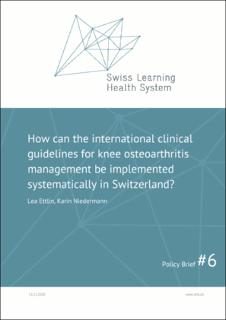Please use this identifier to cite or link to this item:
https://doi.org/10.21256/zhaw-24473| Publication type: | Working paper – expertise – study |
| Title: | How can the international clinical guidelines for knee osteoarthritis management be implemented systematically in Switzerland? |
| Authors: | Ettlin, Lea Niedermann Schneider, Karin |
| et. al: | No |
| DOI: | 10.21256/zhaw-24473 |
| Extent: | 26 |
| Issue Date: | 2020 |
| Series: | SLSH Policy Brief |
| Series volume: | 6 |
| Publisher / Ed. Institution: | Swiss Learning Health System |
| Publisher / Ed. Institution: | Lucerne |
| Language: | English |
| Subjects: | Policy Brief; Implementation; Exercise; Guideline; Knee osteoarthritis |
| Subject (DDC): | 615.82: Physical therapy 616.7: Diseases of musculoskeletal system and orthopaedics |
| Abstract: | Key Messages The challenges: International clinical guidelines for the conservative management of knee osteoarthritis (OA) recommend exercise, education, and weight control (if appropriate) as first-line treatment for all people with knee OA. However, findings from various health care settings have identified an underuse of exercise and education. A recent survey among medical specialists in Switzerland identified an evidence-performance gap, implying that the strong evidence in favour of exercise is not being transferred into clinical practice. On average, only 54% of patients with knee OA were reported to have been referred for specific exercise. The systematic application of structured exercise and education to translate the guideline recommendations into practice would help to overcome this evidence-performance gap in Switzerland. This policy brief summarises the main results from the above-mentioned survey, describes the challenges facing the improvement of conservative disease management (i.e. the systematic application of structured exercise and education) and presents options to address the challenges resulting in three key recommendations. Recommendations: The following describes the three key recommendations for the implementation of the clinical guideline’s recommendation of ‘exercise and education as first-line treatment’ into practice in Switzerland: Translation of guideline recommendations into a specific exercise and education programme Implementing a best-practice exercise and education programme in Switzerland could be a solution to translate the guideline recommendations into practice. There are existing structured exercise and education programmes for knee OA that are already successfully established throughout the world. Facilitation of the systematic application of exercise through standardised treatment pathways The education of health care professionals is important to increase their understanding of the need, the effectiveness and long-term benefits of exercise, as well as the advantages of a structured treatment pathway. This would facilitate the systematic application of exercise and education through standardised treatment pathways. A standardised treatment pathway could could also facilitate an improvement in interprofessional work collaboration. Promotion of the benefits of exercise in the long-term management of chronic diseases: To achieve a paradigm shift from the current situation of simply treating acute symptoms to structured exercise and education and self-management, it is essential to promote the benefits of exercise. The Swiss population should be informed and made aware of the fact that physical inactivity is a risk factor for knee OA related symptoms and that exercise is a beneficial intervention to prevent or improve these symptoms. Implementation considerations: Potential windows of opportunity: • There is high-quality evidence in favour of exercise reducing pain and improving function in people with knee OA. A Cochrane review from 2015 states that further research in this area is unlikely to change the evidence that exercise is beneficial for knee pain and physical function.1 • Financial pressure for cost-effective health care management. • Increased awareness of health and cost benefits of exercise for non-comunicable diseases, e.g. knee OA. • Existing exercise and education programmes for people with knee OA established throughout the world. |
| URI: | https://digitalcollection.zhaw.ch/handle/11475/24473 |
| License (according to publishing contract): | Licence according to publishing contract |
| Departement: | School of Health Sciences |
| Organisational Unit: | Institute of Physiotherapy (IPT) |
| Published as part of the ZHAW project: | Knee osteoarthritis (KOA) in Switzerland |
| Appears in collections: | Publikationen Gesundheit |
Files in This Item:
| File | Description | Size | Format | |
|---|---|---|---|---|
| 2020_Ettlin-Niedermnn_PB_KneeOA_SLHS.pdf | 2.17 MB | Adobe PDF |  View/Open |
Show full item record
Ettlin, L., & Niedermann Schneider, K. (2020). How can the international clinical guidelines for knee osteoarthritis management be implemented systematically in Switzerland? Swiss Learning Health System. https://doi.org/10.21256/zhaw-24473
Ettlin, L. and Niedermann Schneider, K. (2020) How can the international clinical guidelines for knee osteoarthritis management be implemented systematically in Switzerland? Lucerne: Swiss Learning Health System. Available at: https://doi.org/10.21256/zhaw-24473.
L. Ettlin and K. Niedermann Schneider, “How can the international clinical guidelines for knee osteoarthritis management be implemented systematically in Switzerland?,” Swiss Learning Health System, Lucerne, 2020. doi: 10.21256/zhaw-24473.
ETTLIN, Lea und Karin NIEDERMANN SCHNEIDER, 2020. How can the international clinical guidelines for knee osteoarthritis management be implemented systematically in Switzerland? Lucerne: Swiss Learning Health System
Ettlin, Lea, and Karin Niedermann Schneider. 2020. “How Can the International Clinical Guidelines for Knee Osteoarthritis Management Be Implemented Systematically in Switzerland?” Lucerne: Swiss Learning Health System. https://doi.org/10.21256/zhaw-24473.
Ettlin, Lea, and Karin Niedermann Schneider. How Can the International Clinical Guidelines for Knee Osteoarthritis Management Be Implemented Systematically in Switzerland? Swiss Learning Health System, 2020, https://doi.org/10.21256/zhaw-24473.
Items in DSpace are protected by copyright, with all rights reserved, unless otherwise indicated.